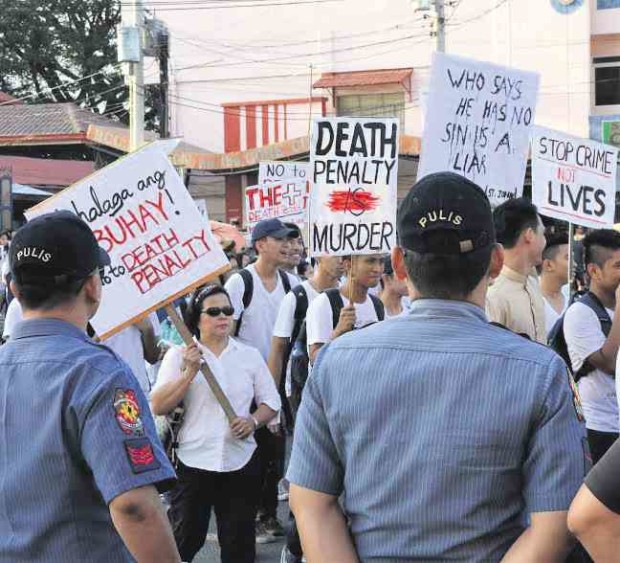
Parishioners in San Carlos City in Pangasinan province add their collective voice to calls against the reimposition of the death penalty. FILE PHOTO/RAY ZAMBRANO
The passage of the death penalty bill will not necessarily pave the way for the passage of other priority Duterte administration bills such as lowering the age of criminal liability and shifting the government system to federalism. Prominent political analyst Ramon Casiple told the radio/Facebook program INQ&A on Tuesday that the other bills faced their own set of difficulties. This reading ran contrary to the fears expressed by some in the congressional opposition that forcing the passage of the controversial bill would cause a stampede leading to the passage of other pet bills.
Federalism, for example, draws more support from Mindanao legislators, who are more passionate about it than lawmakers from Luzon and the Visayas since President Rodrigo Duterte “made it his principal promise.” Non-Mindanao representatives are much more ambivalent or even skeptical about the proposed shift.
“The pressure is heavy, I can feel it in the House,” Casiple said. He did grant that legislators from Luzon and the Visayas may be persuaded to vote for passage in the end. “Even those who are skeptical at the concept, at the end of the day, they’ll say, this is what the President wants, and they will vote for it, as long as there’s no objection that surfaces,” he said in a mix of English and Filipino.
The debate over the proposed reimposition of the death penalty, a key measure backed to the full by Speaker Pantaleon Alvarez, is determined by a different set of circumstances, he said.
“Ang death penalty iba eh, ang circumstances kasi niyan, natanggal na ‘yan ibabalik lang. So there’s a lot at stake, doon sa ganoong klaseng aksyon, like GMA’s position, legacy niya ‘yan, alangan naman tatalikuran ‘yan … Walang ganoong klaseng stake sa federalism (The death penalty is different. Its circumstances — That had already been removed, now they want it back. So there’s a lot at stake in that kind of action. Like GMA’s position. That’s her legacy. You can’t expect her to turn her back on that. There’s nothing like that at stake in the federalism issue).”
Pampanga Rep. Gloria Macapagal Arroyo abolished the death penalty when she was president.
Casiple noted other factors in the death penalty debate, including Protocol 2 of the International Convention on Civil and Political Rights, which mandates the abolition of the death penalty.
“We already ratified the ICCPR long before. It is one of the first UN treaties but we did not specifically ratify the second protocol. It was GMA during her turn who basically signed it and the Senate at that time ratified it,” he said.
“It came out in the hearing, Kung gusto mo umatras sa death penalty, ‘yung commitment na yun, kailangan umatras ka sa whole ICCPR, parang sinabi mo nang umalis na tayo sa UN covenant yan. One of the fundamental documents iyan (If you want to opt out of the death penalty ban, that commitment, you need to opt out of the whole ICCPR. That’s like saying let’s leave the United Nations. That’s one of the fundamental documents).”
Is leaving the UN a real option for the Philippines? Casiple said that he didn’t think so.
“One, malaki possibility na matignan tayo as a rogue state, lalo na kung may killings na na-accuse tayo. Pangalawa, marami tayong involvement sa UN, we have a whole series of treaties, human rights, itong mga old bills – ang tanong diyan, aatrasan mo ba ‘yun? Kasi most of these treaties are monitored and agreed upon within the process of UN (One, there’s a big possibility that we will be seen as a rogue state, especially with those killings that we are accused of. Second, we have a lot of involvement with the UN).”
Duterte last year threatened to pull the Philippines out of the United Nations for criticizing his war on drugs. JN